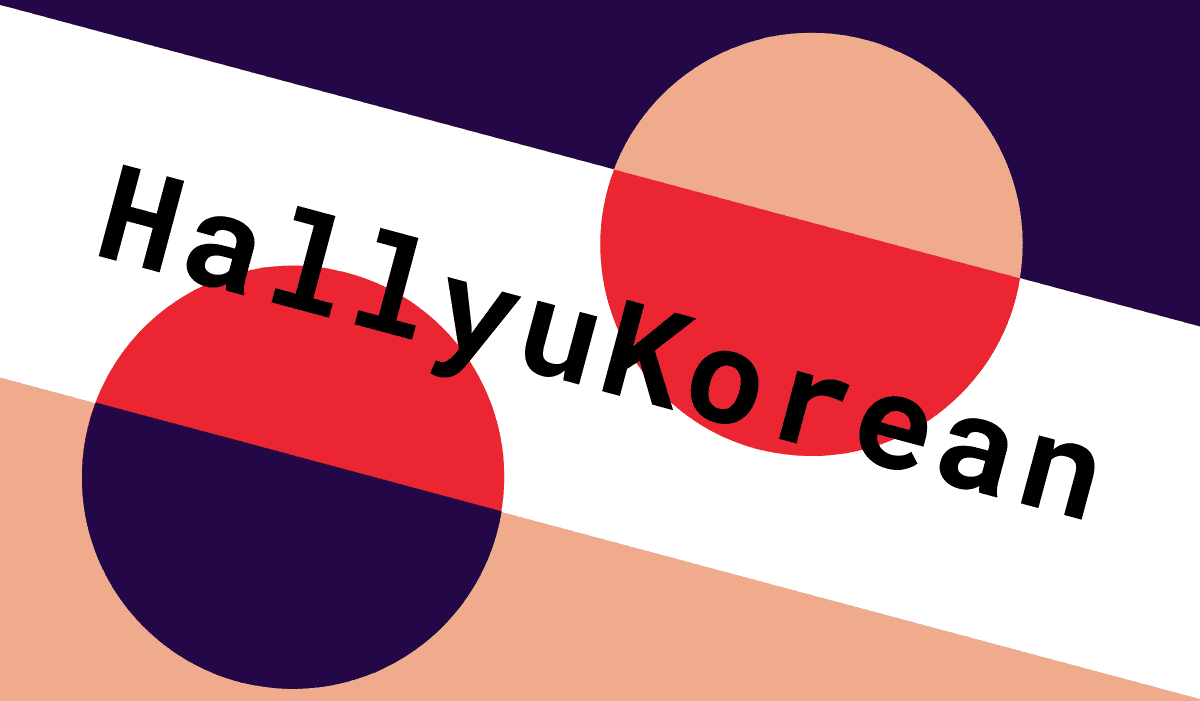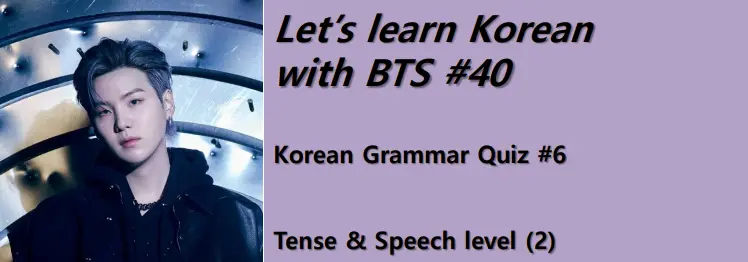Korean Grammar Quiz #6 : Tense & Speech level
Please read and learn from the Learn Korean with BTS posts below and take this quiz to test your knowledge.
1 – Quick Guide to Hangul, Korean
2 – 가다, 걱정, 계속, 괜찮다, 기억, 길
3 – 나, 너, 노래, 누구, 눈, 느낌
4 – 다르다, 다시, 달, 돈, 두렵다, 듣다
5 – 라면, 랩, 레스토랑, 레슨, 로또, 리더
6 – 마음, 많이, 말하다, 매일, 모르다, 미치다
7 – 발, 밤, 별, 보다, 비, 빛
8 – 사람, 사랑, 생각, 세상, 손, 시간
9 – 알다, 오늘, 오다, 우리, 웃다, 원하다
10 – 잠, 좋다, 주다, 지금, 진짜, 집
11 – 차다, 찾다, 처음, 최고, 춤, 친구
12 – 카드, 칼, 커피, 코, 크다, 키스
13 – 타다, 탕진, 태양, 태어나다, 특별하다, 틀리다
14 – 평생, 포기하다, 표정, 푸르다, 피, 필요
15 – 하다, 하루, 함께, 항상, 행복, 힘
16 – 까맣다, 깨다, 꽃, 꿈, 끌어안다, 끝
17 – 땀, 때, 떠나다, 또, 뛰다, 뜨다
18 – 빨리, 빠지다, 빨갛다, 빵, 뻔하다, 뽀뽀
19 – 싸움, 싹, 쓰다, 쓰러지다, 쓸데없다, 씨
20 – 짜증, 짧다, 째다, 쩔다, 찍다, 찢다
Tense & Speech level
Write the correct answer to Q1 ~ Q15.
| Present tense | Past tense | Future tense | |
| 가다 | 가요 | 갔어요 | 갈 거예요 |
| 걱정하다 | 걱정해요 | 걱정했어요 | 걱정할 거예요 |
| 괜찮다 | 괜찮아요 | 괜찮았어요 | 괜찮을 거예요 |
| 기억하다 | 기억해요 | 기억했어요 | Q1 |
| 깨다 | 깨요 | Q2 | 깰 거예요 |
| 끌어안다 | Q3 | 끌어안았어요 | 끌어안을 거예요 |
| 노래하다 | 노래해요 | Q4 | 노래할 거예요 |
| 다르다 | 달라요 | 달랐어요 | Q5 |
| 두렵다 | 두려워요 | 두려웠어요 | 두려울 거예요 |
| 듣다 | 들어요 | 들었어요 | 들을 거예요 |
| 떠나다 | 떠나요 | 떠났어요 | 떠날 거예요 |
| 뛰다 | 뛰어요 | 뛰었어요 | 뛸 거예요 |
| 뜨다 | 떠요 | 떳어요 | 뜰 거예요 |
| 말하다 | 말해요 | 말했어요 | Q6 |
| 모르다 | 몰라요 | Q7 | 모를 거예요 |
| Formal polite | Informal polite | Informal plain | |
| 가다 | 갑니다 | 가요 | Q8 |
| 걱정하다 | 걱정합니다 | Q9 | 걱정해 |
| 괜찮다 | Q10 | 괜찮아요 | 괜찮아 |
| 기억하다 | 기억합니다 | 기억해요 | 기억해 |
| 깨다 | 깹니다 | 깨요 | 깨 |
| 끌어안다 | 끌어안습니다 | 끌어안아요 | 끌어안아 |
| 노래하다 | 노래합니다 | 노래해요 | 노래해 |
| 다르다 | 다릅니다 | 달라요 | 달라 |
| 두렵다 | Q11 | 두려워요 | 두려워 |
| 듣다 | 듣습니다 | Q12 | 들어 |
| 떠나다 | 떠납니다 | 떠나요 | Q13 |
| 뛰다 | 뜁니다 | Q14 | 뛰어 |
| 뜨다 | Q15 | 떠요 | 떠 |
| 말하다 | 말합니다 | 말해요 | 말해 |
| 모르다 | 모릅니다 | 몰라요 | 몰라 |
Quiz Answers
1-기억할 거예요, 2-깼어요, 3-끌어안아요, 4-노래했어요, 5-다를 거예요
6-말할 거예요, 7-몰랐어요, 8-가, 9-걱정해요, 10-괜찮습니다
11-두렵습니다, 12-들어요, 13-떠나, 14-뛰어요, 15-뜹니다
*Tense
*Present tense : Adjective/verb stem + ~아/어/해요
*Past tense : Adjective/verb stem + ~았/었/했어요
*Future tense : Adjective/verb stem + ~(으)ㄹ 거예요 / ~ㄹ 게요/ ~겠어요
The basic way to get the verb/adjective stem is to remove 다 from the verb/adjective.
If there is a vowel ㅏ or ㅗ on the final syllable of the adjective/verb stem, 아요(present tense), 았어요(past tense), 을 거예요(future tense) is used.
If there is a vowel other than ㅏ or ㅗ on the final syllable of the adjective/verb, 어요(present tense), 었어요(past tense), ㄹ 거예요(future tense) is used.
Also, if there is 하다 in the adjective/verb, 하다 changes to 해요(present tense), 했어요(past tense), 할 거예요(future tense).
*Speech levels
The three most commonly used Korean speech levels are 합쇼체 (formal polite), 해요체 (informal polite) and 해체 (informal plain).
*The formal polite style : Adjective/verb stem + ~(스)ㅂ니다
~(스)ㅂ니다 is used more in formal or public situations including the military, news, reporting presentations, meetings and lectures. It’s mainly used to address large gatherings or people you don’t know personally.
*The informal polite style : Adjective/verb stem + ~아/어/해요
~아/어/해요 is most commonly used in everyday life. Compared to the formal polite style, the informal polite style is softer and less formal, so it is mainly used among family members, friends, shopkeepers and other close acquaintances.
*The informal plain style : Adjective/verb stem + ~아/어/해
As for the informal plain style ~아/어/해, it is mainly used among friends from superiors to people of lower rank and among family members.


Fantastic web site. A lot of useful info here. I am sending it to several friends ans also sharing in delicious. And obviously, thanks for your effort!